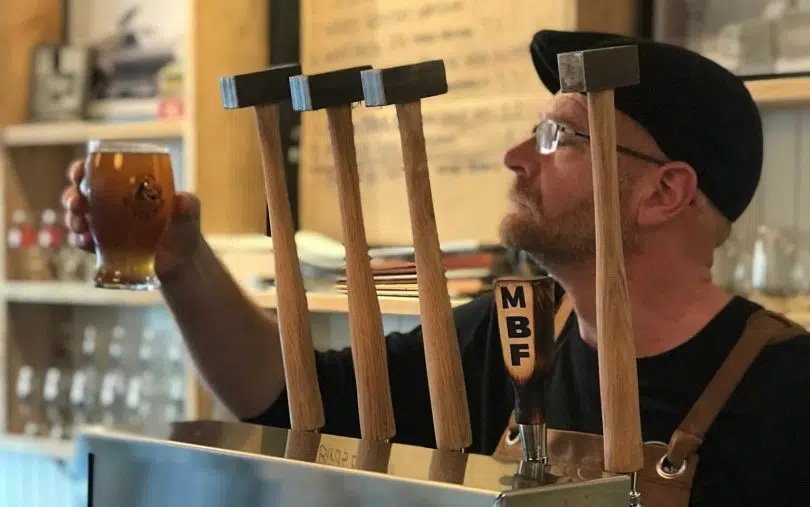
Rick Lockhart. Image: Submitted
NB Liquor (ANBL) has launched a 10-month pilot program that allows the province’s craft alcohol producers to cross-sell through each others’ locations, effective immediately.
The policy allows small volume producers to sell their New Brunswick produced-and-packaged products to each other’s Manufacturers Agency Store (MAS) locations at the production site.
“There are about 70 of these locations across the province, so if there’s a craft brewer that would have been just selling craft beer, they’ll actually now be able to collaborate with wine producers and spirits and even mead to be able to cross-sell those products in their brewery locations,” said Christine Comeau, the executive director of the New Brunswick Craft Alcohol Producers Association.
“It means a local producer could become much like a speciality craft alcohol liquor store.”
The policy only applies to packaged products sold for consumption by public customers at home. NB Liquor won’t collect mark-up on any of the products sold at approved MAS locations, said ANBL spokesperson Tom Tremblay in an e-mail.
“At ANBL we recognize the immediate need from many local producers for a hyper-local distribution of products to feature their select portfolios in key pockets of the province. We also recognize many lower volume [local producers] currently do not have the infrastructure or capacity to deliver on the necessary sales results of the ANBL product life cycle process,” he said.
“[Local producers] excel in product innovation and creativity and with that, instant speed to market is important. [Local producers] who create and experiment as part of their business development process will be able to incubate innovative ideas and one time offers in this new channel.”
The move opens up the distribution channel for small producers, Comeau said. Nanobrewers, which before could only sell to licensees like bars and restaurants or NB Liquor, are especially affected as they can now sell through the network of 70 potential retail outlets.
She said the hope is the program would promote innovation among producers such as bundling products or creating seasonal or one-off products.
“You don’t have to go through a listing that you would typically need to do through NB Liquor,” she said. “The margins are better to be selling through this newly expanded network versus going through the liquor stores.”
For Sussex Ale Works’ owner Rick Lockhart, who has had to close his taproom due to Covid-19, the policy would be a tremendous help, he said. He’s seen increasing demand for craft beer in Sussex in the last few years and he’s been having a hard time keeping up with that demand with his small-batch system.
“This is going to allow me to fulfill the need and offers a lot more variety in what we’ve been able to offer up to this point for my customers,” he said.
While Lockhart has been selling about the same amount of products, sales have fallen because they’re sold at the lower ‘take-away’ price rather than taproom price.
With the new program, he’s looking to work with other breweries he’s worked with before like Holy Whale Brewing Co. and 3Flip Brewing.
“We’re taking it slowly at first, but I think it’s going to expand. I think it’s going to be great for the small producers. This is really a step in the right direction,” he said.
Lockhart has had to let go of all staff and move to an online store due to the pandemic, offering his products via delivery and curbside pick-up.
Now that restrictions are looser, Lockhart has been able to re-hire one staff member. Although he misses his customers, he’s hesitant to re-open his taproom, which is only about 19 feet by 25 feet in size.
He said public health requirements would mean he has to limit the number of customers, monitor their temperature and physical distancing, and ask them a bunch of questions. It doesn’t really align with what the brewpub is all about – “community connections, conversation, laughter, and enjoyment.”
“It is about the beer, but it’s not all about the beer. It’s about enjoying the beer in a comfortable space,” he said.
“It really doesn’t fit in with our brand to treat our customers like that, so we’re taking a stand that we’re going to remain doing what we’re doing, supplying the craft beer needs of our customers until all restrictions are lifted and customers can safely come in here and interact with other customers and our staff in a safe way.”
A version of this story was published in Huddle, an Acadia Broadcasting content partner.






